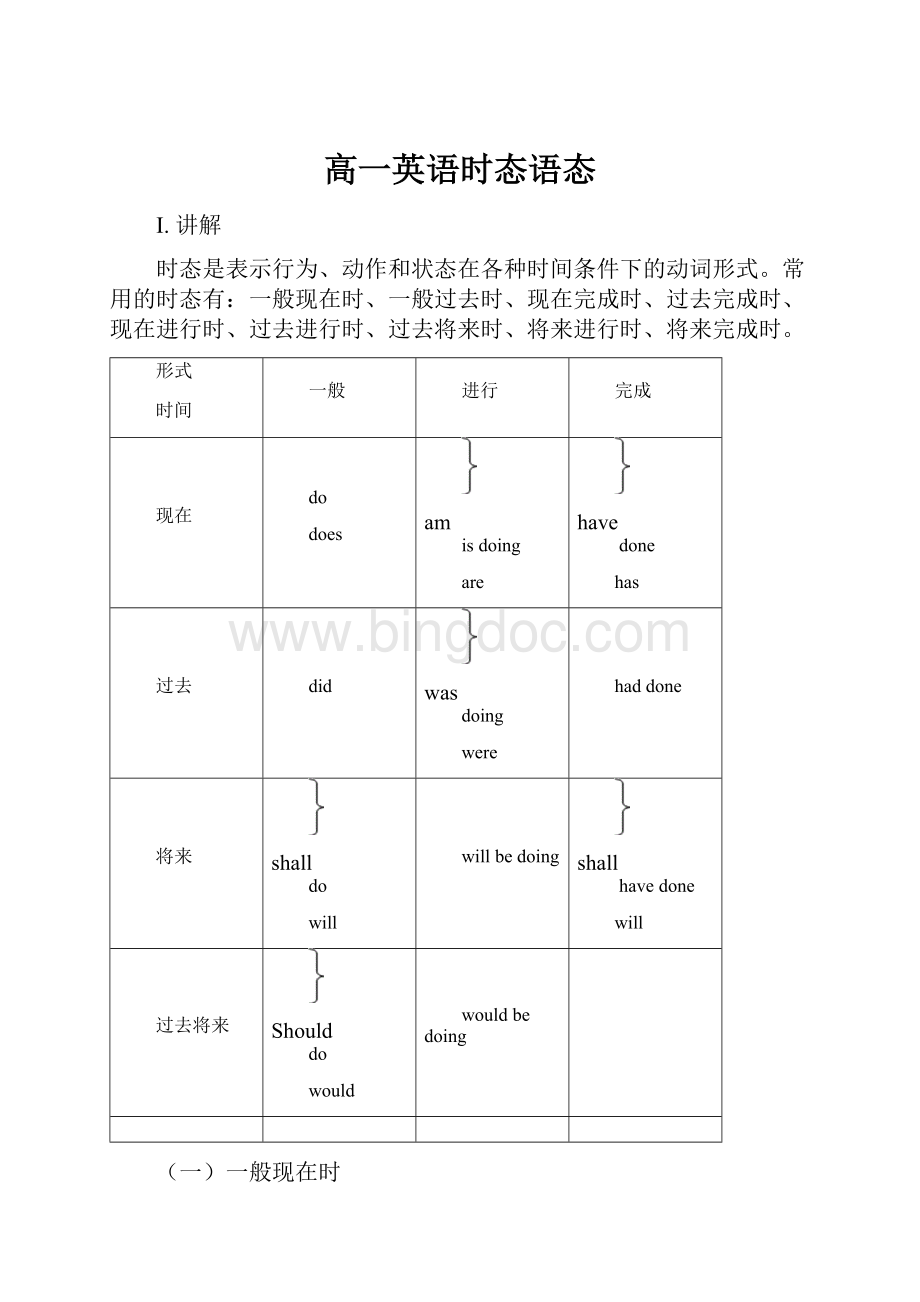高一英语时态语态.docx
《高一英语时态语态.docx》由会员分享,可在线阅读,更多相关《高一英语时态语态.docx(16页珍藏版)》请在冰点文库上搜索。

高一英语时态语态
I.讲解
时态是表示行为、动作和状态在各种时间条件下的动词形式。
常用的时态有:
一般现在时、一般过去时、现在完成时、过去完成时、现在进行时、过去进行时、过去将来时、将来进行时、将来完成时。
形式
时间
一般
进行
完成
现在
do
does
am
isdoing
are
have
done
has
过去
did
was
doing
were
haddone
将来
shall
do
will
willbedoing
shall
havedone
will
过去将来
Should
do
would
wouldbedoing
(一)一般现在时
1.通常表示现阶段经常发生的动作、存在状态或经常的习惯性的动作。
常与often,usually,always,sometimes,today,everyfiveminutes,onSundays等时间状语连用。
Theoldman_________(go)toparkeverymorning.
2.表示永恒的真理以及客观事实。
Theearth__________(go)roundthesun.
3.表示按规定或计划要发生的动作。
Thetrain____________(start)atseveninthemorning.
4.在时间和条件状语从句中代替一般将来时。
I’llgowithyou,ifyou________(be)freetomorrow.
(二)一般过去时
1.一般过去时表示过去某一时间发生的动作或情况。
常与表示过去的时间状语ago,yesterday,lastweek,intheolddays,whenIwasfiveyearsold,in1995等连用。
They_________(begin)toworktwomonthsago.
2.一般过去时多和表示过去了的时间状语连用。
但是有时候句子并没有过去的时间状语,这时就要通过语境、说话人的口气来判断。
I__________________(notexpect)youwerewaitingforus.
3.usedtodosth.意为“过去常常做某事”,暗含“现在不做了”之意。
beusedtodosth.意为“被用于做某事”,不定式表示目的,可用于多种时态。
beusedtodoingsth.习惯做某事。
Heusedto___________________(getup)early.
Hewillbeusedto_________________(getup)early.
Woodisusedto______________(make)paper.
(三)一般将来时
1、表示将要发生的动作或存在的状态,常用的时间状语有later(on),soon,inamonth,nexttime,fromnowon,tomorrow等。
I______________________(be)eighteenyearsoldnextyear.
He______________(notgo)totheairporttomeetherthisafternoon.
2、一般将来时的其它表示形式
(1)一般现在时表将来
①按照计划或时刻表要发生的事情。
Thenewlibrary____________(open)nextmonth.
Theplane________________(takeoff)at3:
00P.m.
②在条件状语从句和时间状语从句中用一般现在时表将来。
Ifyou__________________(leave)tomorrow,I’llseeyouattheairport.
Whenshe___________(come),I’lltellheraboutit.
(2)现在进行时表将来
现在进行时表示将来,往往是指计划好或准备要做的事。
一些表示动作转换的终止性动词,如go,come,leave,start,begin,stay,takeoff,arrive等,或者也称为位移性动词,其进行时表示马上要做某事。
I___________(take)thekidstothezoothisSunday.
He____________(leave)schoolinoneyear’stime.
(3)betodosth结构表示计划中约定的或按职责、义务和要求必须去做的事或即将发生的动作。
Thepresident____________(visit)JapaninMay.
I__________________(get)marriednextyear.
(4)beabouttodo.结构表示“刚要做某事,马上要做某事,正要做某事”,强调动作即将发生(不跟表将来的时间状语连用)。
Weareaboutto______________(discuss)thisproblem.
Theywereaboutto____________(leave)whenthetelephonerang.
3、will和begoingto的区别。
(1)will多表示带意愿色彩的将来或客观上将来要发生的事,也可表示临时做出决定将要做的事。
I______________(stay)withyouandhelpyou.
—Youhaveleftthelighton.
—Oh,soIhave.I_______________(go)andturnitoff.
(2)begoingto常用于口语中,主要用来表示将发生的动作或存在的状态、打算或准备要做的事或根据某种迹象判断可能将要发生的事。
There__________________________(be)anEnglishfilmthisevening.
Lookatthoseclouds.It_____________________(rain).看那些乌云,要下雨了。
(四)现在完成时
1、表示过去发生或已经完成的某一动作对现在造成的影响或结果。
常与already,ever,never,just,yet等副词连用。
I________just_____________(finish)myhomework.
2、表示从过去某时刻开始,持续到现在的动作或情况,并且有可能会继续持续下去,此时经常用延续性动词。
时间状语常用since加一个过去的时间点,或for加一段时间,或加一个现在时间。
I________________________(know)himforthreeyears.
He____________________(live)heresince1995.他自1995年以来就住在这儿。
【注意】
(1)因为含有for加一段时间或since加一时间点这样的时间状语的完成时,有延续性的特点,所以不能使用瞬间动词。
Mysister__________________________(marry)for5years.
Mysister_________________(marry).Don’tdisturbher.
(2)在This/That/Itisthefirst/second/third/..timethat..句型里,从句要用现在完成时。
Thisisthesecondtimethattheproductsofourcompany____________________(show)intheInternationalExhibition.
(3)句型Itis/hasbeen...since..所使用的两种时态都正确。
It_________________(be)10yearssinceIlastsawhim.
(五)过去完成时
1、过去完成时是一个相对时态,表示过去的过去,只有在两个过去发生的动作相比较时才可显示出来。
Whenwegottothestation,thetrain__________________(leave).
2、过去完成时表示截止到过去某一时间已经完成的动作。
Bytheendoflastmonth,we________________(review)fourbooks.
3、表示思维的动词用过去完成时,意为“原本……(但事与愿违)”。
I_____________________(think)thathewouldwin.
We_______________________(believe)thathecouldtellthetruth.
(六)现在进行时
1、现在进行时表示说话时或现阶段正在进行的动作。
Listen,someone____________(cry).
What________you___________(do)thesedays?
2、有时,现在进行时也与always等副词连用,表示反复出现的习惯性动作,用以表达说话人赞扬、讨厌等情绪。
He______always_____________(ask)thesamequestion.(厌烦)
3、动词go,come,leave,arrive,start,begin,end等表将要发生的动作时也用现在进行时。
They________________________(leave)forShanghai.
4、状态动词be,have,belongto,remember,know,love,like,prefer,remember,forget,hope,wish,want,see,hear,find,feel等一般不用于进行时。
________you__________(know)whereheis?
(七)过去进行时
1、表示在过去某一时刻或过去一段时间内正在发生的动作。
I__________________(do)myhomeworkatthistimeyesterday.
2、如果when,while这样的时间状语引导词所引导的主从句之一是一般过去时,则另一个句子常用过去进行时。
I__________________________(wash)myhairwhenyouknockedatthedoor.你敲门的时候我正在洗头发。
【辨析】现在完成时与一般过去时
现在完成时是联系过去和现在的纽带,它强调过去的动作对现在的影响;一般过去时只表示过去的某个具体时间里发生的动作,与现在没有联系。
试比较:
He____________(work)inthathospitalfor8years.
(表示他从过去开始工作,一直工作到现在,可能现在仍在那家医院工作。
)
He______________(work)inthathospitalfor8years.
(这只是讲述一个过去的事实,表示他现在已经不在那家医院了。
)
_________you__________(have)yourlunch?
What__________you_____________(have)forlunch?
I_________________________theGreatWall,andI__________therelastsummer.我去过长城,我去年夏天去的。
II.巩固练习
1.Here______thebus!
A.iscoming B.comes C. hascome D.hasbeencoming
2.It’sthethirdtimeI______himthismonth.
A.hadseen B.see C.saw D.haveseen
3.Ifyougotothewesternsuburbsofthecity,you______alotofnewbuildings.
A.willsee B. haveseen C.see D.aregoingtosee
4.—IhaveboughtanEnglish-Chinesedictionary.
—Whenandwhere______you______it?
A.dobuy B. didbuy C.have bought D.hadbought
5.Sheshowedhimthephotoshe______thedaybefore.
A.hastaken B.took C.wastaking D.hadtaken
6.WhileTom______,hissisteriswriting.
A.reads B.hasread C.hasbeenreading D.isreading
7.Bythetimehewasten,Edison______experimentsinchemistry.
A.hadalready done B.alreadyhaddone C.wasalreadydoing D.already did
8.Idon’tknowifit______ornottomorrow.
A.willsnow B.snows C.hassnowed D.issnowing
9.Hewassixty-eight. Intwoyearshe______seventy.
A.wasgoingtobe B.would be C.hadbeen D.willbe
10.Tom______formorethanaweek.
A.hasleft B.hasgoneaway C.wentaway D.hasbeenaway
11.Hesaidthathonesty______thekeytosuccess.
A.was B.willbe C.is D.isbeing
12.JoanhasgonetoLondonthismorning.She______theretillnextMonday.
A.willhavestayed B.hasstayed C.isstaying D.hasbeenstaying
13.We______eachothersinceIleftShanghai.
A.haven’tseen B.hadn’tseen C.didn’tsee D.wouldn’tsee
14. I’llreturnthebooktothelibrary assoonasI______it.
A.willfinish B.amgoingtofinish C.finished D.havefinished
15.Shehasboughtsomecloth;she______herselfadress.
A.makes B.isgoingtomake C.wouldmake D.hasmade
16.Don’tgoandbotherhim.He______intheroom.
A.writes B.haswritten C.iswriting D.hasbeenwriting
17.Thereasonwhyprices________,andstillare,toohighiscomplex,andnoshortdiscussioncansatisfactorilyexplainthisproblem.
A.wereB.willbeC.havebeenD.hadbeen
18.Maryreallyhardonhisbookandthinkshe’llhavefinisheditbyFriday.
A.workedB.hasbeenworkingC.hadworkedD.hasworked
19.Shetoldmethatherfather______tothepostofficewhenIarrived
A.justwent B.hasjustgone C.hadjustgone D.hadjustbeengoing
20.Don’tgetoffuntilthebus______.
A.stopped B.willstop C.willhavestopped D.stops
21.HemusthavesensedthatI____him.Hesuddenlyglancedatmeandsaidquietly,"Whyareyoustaringatmelikethat?
"
A.wouldlookatB.lookedatC.waslookingatD.amlookingat
22.He______withussincehereturnedlastmonth.
A.lives B.lived C.had lived D.has lived
23.They______tohelpbutcouldnotgethereintime.
A.hadwanted B.havewanted C.waswanting D.want
24.Theywillgotoworkinthecountrysidewhenthey______schoolnextyear.
A.willleave B.willhaveleave C.areleaving D.leave
25.Ididn’tknowwhenthey______again.
A.came B.werecoming C.hadcome D.hadbeencoming
26.JustasIgottotheschoolgate,IrealizedI______mybookinthecafe.
A.haveleftB.hadleftC.wouldleaveD.wasleaving
27.They______hereformorethanamonth.
A.havearrived B.havereached C.havecome D.havebeen
28.We______ameetingfrom2to4yesterdayafternoon.
A.hadhad B.wouldhave C.were having D.had
29.ShetoldusshehadmetyouinLondonlastyear.______you______hersince?
A.Had;met B.Did;see C.Would;meet D.Have;seen
30.Itisreportedthataspacestation______onthemooninyearstocome.
A.willbebuildingB.willbebuiltC.hasbeenbuildingD.hasbeenbuilt
31.—IsPetercoming?
—No,he______hismindafteraphonecallatthelastminute.
A.ChangesB.changedC.waschangingD.hadchanged
32.I______Tomhasmadeamistake.
A.amthinking B.shallthink C.think D.havebeenthinking